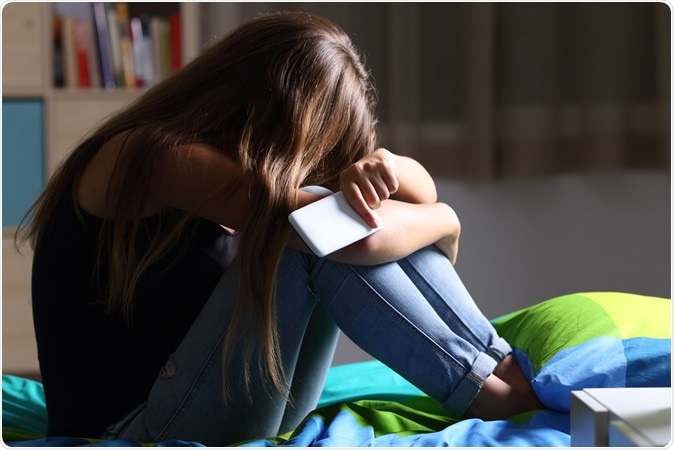Yet another study has revealed that more time spent on social media translates into higher rates of depression especially among young girls. The new study reveals that girls are worst affected by depression due to poor sleep and online bullying compared to boys. The results of the study were published in the journal EClinicalMedicine, published by the Lancet.

Image Credit: Antonio Guillem / Shutterstock
The study from researchers at the University of Essex and University College London, finds that 14 year old girls sleep for seven hours or less each night because they are awake and active on social media. These girls are also unhappy with their appearances. Professor Yvonne Kelly, from University College London, and leader of this study said, “it seems, are struggling with these aspects of their lives more than boys, in some cases considerably so.” The team and other experts warn that this could be an indicator of the range of mental ailments seen in young women when compared to young men. They warn about self harm and suicidal thoughts among young woman as a result of these factors.
The team interviewed around 11,000 14 year olds who were part of the Millennium Cohort Study. They noted that girls spent more time on social media than boys and these girls had more pronounced signs of depression than boys. Their depressive moods could directly be correlated with the time they spent on social media platforms such as Instagram, WhatsApp and Facebook. Kelly added, “The link between social media use and depressive symptoms was stronger for girls compared with boys. For girls, greater daily hours of social media use corresponded to a stepwise increase in depressive symptoms.”
The participants of the study were provided with questionnaires to fill up. These asked about their social media use and assessed their mental health. Symptoms of depression were measured using the Moods and Feelings Questionnaire. The participants had to agree or disagree to statements such as, “I felt miserable or unhappy”, “I felt so tired I just sat around and did nothing” and “I didn’t enjoy anything at all”. Their perception over the last two weeks was assessed using the questionnaire. Results showed that girls used the social media more than boys and around 40 percent of girls and 20 percent of boys were using it for more than three hours per day. Total abstinence from social media was seen in only 4 percent girls and 10 percent boys.
The team was alarmed to note the amount of sleep deprivation among these 14 year olds. They found that only 5.4 percent of girls and 2.7 percent of boys slept for seven or less hours per night. Among those with depression and low mood, 48.4 percent girls and 19.8 percent boys said that they got less than seven hours sleep. They noted than one in two girls and one in four boys had a disrupted sleep “most of the time”. Social media could be blamed for the sleep disruption say the authors of the study. These adolescents often sleep with their phones by their bedside and are woken up by the social media alerts.
They found on analysis that 12 percent of the light social media users and 38 percent of the heavy social media users were suffering from symptoms of depression. Results revealed that adolescents spending three to five hours of social media per day had a 26 percent increase in depression scores in girls and a 21 percent rise in depression scores in boys. This was in comparison with teenagers who used it for one to three hours/day. Among kids who used social media for over five hours per day, the depression scores rose by 50 percent in girls and 35 percent in boys compared to the light users.
They noted that apart from sleep deprivation, online bullying was another underlying cause for depression. The researchers write, “The most important pathways were via poor sleep and online harassment. For example: more social media use linked to poor sleep which in turn was related to depressive symptoms; experiencing online harassment was linked to poor sleep, poor body image and low self-esteem; and that girls and boys with poor body image were more likely to have low self-esteem.”
The authors of the study write as a conclusion of their study, “There is moderately strong evidence for an association between screen time and depressive symptoms. This association is for overall screen time but there is very limited evidence from only one review for an association with social media screen time. There is moderate evidence for a dose-response effect, with weak evidence for a threshold of ≥2 hours daily screen time for the association with depressive symptoms.”